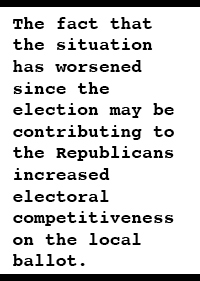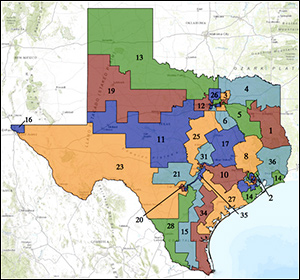By Jim Ellis
June 8, 2021 — On Saturday, Republican candidates picked up three victories in a trio of Texas mayoral runoffs, the most surprising of which came in the Mexican border city of McAllen where the Hispanic population is close to 85 percent.
 McAllen City Commissioner (Council) Javier Villalobos, a former Hidalgo County Republican Party chairman, won the mayoral runoff election with a 51-49 percent victory. This on the heels of the Texas-Mexico border region voting much more Republican in 2020 than in previous electoral history. From the congressional district that houses McAllen, Rep. Vicente Gonzalez (D-McAllen) won his November re-election contest with only a 50.5 – 47.6 percent victory margin.
McAllen City Commissioner (Council) Javier Villalobos, a former Hidalgo County Republican Party chairman, won the mayoral runoff election with a 51-49 percent victory. This on the heels of the Texas-Mexico border region voting much more Republican in 2020 than in previous electoral history. From the congressional district that houses McAllen, Rep. Vicente Gonzalez (D-McAllen) won his November re-election contest with only a 50.5 – 47.6 percent victory margin.
In Ft. Worth, an election that broke more definitively along partisan lines, though all of the mayoral elections in the state are nonpartisan in that the candidate’s political party affiliation does not appear on the ballot, Republican Mattie Parker defeated Tarrant County Democratic Party chair Deborah Peoples. The spread was 54-46 percent in a contest where turnout more than doubled the aggregate mayoral vote of four years ago. Voter participation was up in all three of the Texas city runoff elections, but none like the huge increase in Ft. Worth.
The least partisan of the races occurred in Arlington, where former police officer and local businessman Jim Ross defeated Arlington City Councilman Michael Glaspie, also with a 54-46 percent margin. In this election, law enforcement seemed to dominate the campaign as five different police and fire associations rallied to support Ross.
As mentioned above, South Texas voting ventured more toward the Republicans in November even though Democrats still proved victorious in the region. Biden’s margin over then-President Trump dropped as low as 50-48 percent in Rep. Gonzalez’s 15th District, and under 52 percent in three of the four CDs that touch the Texas-Mexico border.






